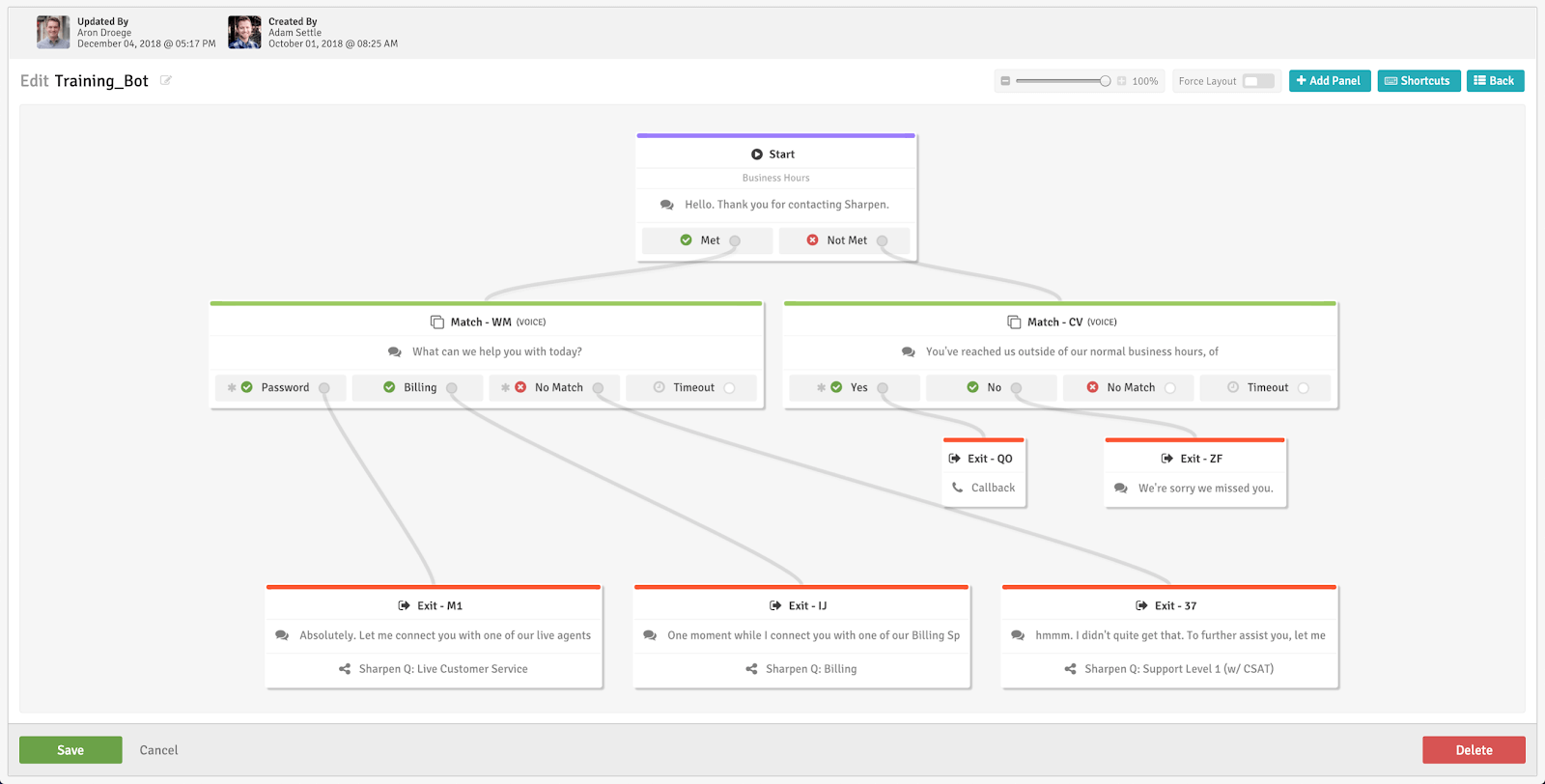
6 Benefits to Look for When Choosing Your Next Cloud Call Center Phone System
In the best of times, your customers never call you. They sit happy with their products and services, don’t have any issues to report, and self serve when they do have questions.
In the worst of times (we’re looking at you, 2020), your customers won’t stop picking up the phone. They seek a scapegoat for their problem. And it turns out, your agents make a great fall guy.
You see, phone calls let your customers speak their minds. Most people aren’t like me – better at typing than talking. They prefer to hop on a call, air their grievances, make a snide comment or two, then get the help they need. Firing off an email and waiting a few days for a response just isn’t good enough. Calls get the job done. Your customers make sure of it.
Customer calls are the lifeblood of your call center.
Yeah, the world is shifting and we like to text and chat online more than we like to pick up the phone. You need omnichannel service to support modern customers. But the reality is, your customers are still calling you. A whopping 93% of customers still call you at some point in their journey. And phone calls won’t vanish anytime soon.
So, to give your customers the best possible experience, you need a call center phone system that supports a seamless and reliable experience. And in today’s age of unpredictability, you need a phone system that won’t interrupt your service – no matter the circumstance.
[Download Now] 101 questions to ask on your next call center system RFP
You need your agents available to handle an uptick in interactions even when they need to work remotely. You need reliability and redundancy to make sure a problem with hardware won’t impact your service levels. What you really need, is a cloud call center phone system. So, as you seek to move your call center to the cloud (or mature your current cloud tech), here are some game-changing benefits to look for in your next call center phone system.
Look for these 6 benefits in cloud call center phone systems:
1. Call Recordings and Transcriptions
To deliver on the service your customers expect, you need insight into what’s happening during every interaction. Look to vendor partners who offer up crucial coaching and development tools like scorecards, call recordings and transcriptions.
Your ability to access 100% of your agent’s recorded phone calls is fundamental to building a coaching program backed by context. And pairing those recordings with easy-to-digest transcriptions helps you scan through interactions and offer feedback on calls faster.
Integrated coaching, the coaching that happens immediately after calls, can improve team performance by 12%. And, the best managers spend 75% of their time coaching in-the-moment.
When you pair recording and transcription tools with training, you can highlight specific areas of a call where an agent needs to improve, or where you want to give praise. Then, your agent has a tool to quickly glance at feedback and apply it to their next conversation, incrementally improving the customer experience daily.
2. Customizable Reporting
More than a quarter of contact center leaders (26%) said failing to prioritize data and reporting capabilities in their call center technology was their biggest mistake last year.
The data flowing into your call center phone system gives you tons of information about what your customers really want from their service experience. But often, vendors hide behind expensive reporting packages and add-on price tags for customizing your own data.
Your call center phone system should store data from every phone interaction in the cloud and make it accessible to your admins, your supervisors, your agents, and any stakeholder who would benefit from seeing a report. Your software shouldn’t keep your data under lock and key. The best systems let you harvest and manipulate your data, so you can gain useful insight about how to make your customer experience better.
Prioritize reporting and access to your data when changing your tech.
[Read Next] Your data is the nucleus of your contact center: Learn how to use it
3. Intelligent Call Routing
Your customer’s first touchpoint with your brand often isn’t with an agent, it’s with your IVR.
So when seeking out a phone system to fit your customer needs, make sure an intuitive IVR is on the list. Intelligent routing and call flows help your customers get to resolutions faster.

Think through what’s important to your customers when you route their interactions to decide what routing engine makes the most sense. Do your agents all have the same skill set? Or are some more technical than others? Do callers need to enter information (and authenticate it) in your IVR, like a bank account number? Or, do you need to route interactions based on priority – for those customers who need extra attention?
Choose a phone system that lets you customize your call routing based on your customer’s needs and your agents’ skill sets. And, shortlist the vendors who make it easy to change up your call routes as your customer journey evolves. Tagging in IT every time you need to reroute a phone call will stall your customer service and send customers down a spiral of fury.
[Learn More] Intelligently route customers to the right place and add bots to your workflow with Sharpen Logic
4. A Partner in Service
Have you ever bought a product or service, then had an issue pop up and realized you had to pay more just to talk to a human for help? Yeah, some companies actually charge extra for basic customer service (*cough, not us *cough*). Watch out for this when vetting your cloud call center phone system.
Your customer experience is always changing. Which means your business needs change, too. Your call volume looks different in your peak season than in the midst of your off-vacation season. As you scale and shift your business model, you need a vendor partner who moves with you. If not, you’ll interrupt your customer service trying to make simple changes to meet your customer goals.
Seek out service from your call center phone system partner that includes:
- Uptime guarantees
- 24/7 service
- Documentation and admin guides
- A team of people to help you reach your business goals
- Onboarding & implementation training
- Continued training and eLearning courses
Good customer service isn’t option for you. It shouldn’t be for your vendor, either.
5. Reliability & Redundancy
You need a provider that you can trust won’t cut off your calls mid-interaction and works seamlessly with your contact center platform.
And if you (or another customer using the same system) experiences a spike in demand, the load of one service shouldn’t impact the performance of the others. Look for a system that can scale with you and maintain availability no matter the volume you experience.
[Read Next] What’s next for digital transformation and what it means for you
What’s more? Where your agents work shouldn’t be a drag to your customer service. Ask your potential vendors about their Points of Presence and availability zones, so you choose a system with architecture that supports quality voice in the areas you need it.
And, see what procedures they have in place to keep calls flowing if one instance has a problem. Do they have failover procedures to balance capacity across other healthy instances, making sure your service stays afloat? Reliable, stable communication is the backbone of your business. Communication service disruptions are just not an option.
6. Integrations
Companies with a unified tech stack are 131% more likely to outperform their business goals. But today, some 92% of agents say their agent-facing applications could be more effective.
As you pinpoint what call center phone system suits your business needs, think through the other systems you have in place, too. This year leading companies plan to give frontline workers, like salespeople and your agents, more access to data to inform their conversations. The more investments in cloud CRMs and ticketing systems, the harder it will become to integrate and share customer data with legacy call center systems.
Your agents need access to customer history to inform their calls, so they can deliver lasting resolutions to your customers. And, they need to find all that info without playing Frogger, hopping from screen to screen, waiting for a frustrated customer to hit them with a snide remark.
Seeking out a system that integrates with your current customer platforms (or has the ability to), helps you streamline your tech to make your agents’ work easier. And a decade of research out of Glassdoor shows us, happier agents make happier customers.
[Download Now] 101 questions to ask on your next call center system RFP

